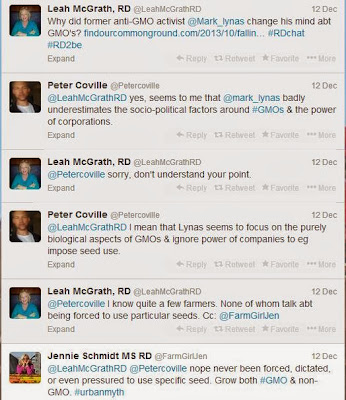As a family farm, we grow both GMO (we don't actually use this term but for the sake of this blog, am using it for the reader for whom it may be a descriptor) and non-GMO crops and choose our seed produced from a variety of different seed companies, buying directly from our neighbors, which frankly, is the whole point of the fabric of rural America. We support one another.
So we have technology agreements? Absolutely. Both our GMO and non-GMO seeds have either technology agreements or proprietary restrictions from saving seed. As Rob Wallbridge shares in his blog An Organic Farmer Walks Into Monsanto, even organic seed has proprietary rights and cannot be saved. Seed is not unlike publications that can be copyrighted to protect the author's work. There would be far fewer food choices. Regardless of the methods of seed development, we have many, many more choices as consumers as a result of plant breeding. It is not surprising or for that matter unusual for people outside of agriculture to protect the rights to their work, why should it be different for agriculture?
The seeds and varieties we choose to plant are based on the demand we have for the markets in our area. In our tomato crop, the cannery wants specific varieties for specific products so one Roma variety is grown for stewed tomatoes while another Roma variety is grown for tomato sauce. We grow for the needs of the cannery. Likewise for our tofu customers, they tell us which soybeans they prefer and we grown to meet their needs. Likewise for our winery customers, we grow the grapes they want to process into wine.
We are also "seed" growers meaning we grow specific varieties for companies that will be then sold as seed. Farmers who can grow seed-quality seed get paid a premium for growing this level of purity. These seeds need to be "IP" Identity Preserved - genetically consistent and true to their traits, of highest quality meaning they are uniform in size, shape, color, free of weed seed and contamination.
We also grow "public domain" seed which are seeds that can be saved. These are seeds developed mainly by Universities, which are dwindling in size and support for agricultural research. These varieties need to be tested for vigor and germination in order to determine if they are viable for the next cropping year or if they should be used for livestock feed. We use public varieties of both wheat and barley for both the commodity market and our winter cover crops.
The bottom line is we as farmers have choice - what seed we buy, from which company, and what traits those seeds have. The only time we don't have choice is when we sit on our thumbs and don't order seed in time and end up with 2nd or 3rd choices.
